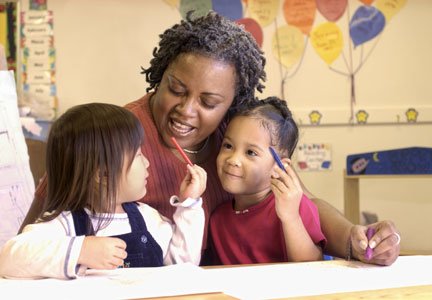Among students enrolled in a City Schools pre-k program, 48.1 percent were ready for kindergarten compared to 45 percent statewide, based on results on the Kindergarten Readiness Assessment (KRA) released by the Maryland State Department of Education on April 26, 2016.
Before entering kindergarten at City Schools, students come from several different settings, but results from the KRA show students who attended pre-k were more ready for kindergarten. Of the 6,277 students who received results on the KRA, more than half (3,911 students) came from a City Schools pre-k program, which includes City Schools pre-k and Judith P. Hoyer Early Child Care and Family Education Centers, or “Judy Centers.”
Overall, of all City Schools kindergartners from every setting, almost 42 percent demonstrated readiness to learn. This represents a new baseline for the district after significant changes were made to the assessment since its introduction last year.
“These results confirm what we’ve known all along— not only does pre-k matter, but City Schools has a really strong pre-k program,” said Dr. Gregory Thornton, CEO of Baltimore City Public Schools. “With eight new pre-k classes and five Judy Centers this school year, we are excited to give more young people the opportunity to learn and grow with City Schools.”
“This year, teachers can access student results from the KRA immediately,” said Chief Academic Officer Linda Chen. “Teachers use this information to help personalize instruction to meet a student’s specific needs. Students are now able to receive age-appropriate individualized instruction more quickly and for a longer period of time.”
The KRA, a new statewide assessment aligned to the Maryland College and Career-Ready Standards, was administered for the first time last school year. Students are described as “demonstrating,” “approaching,” or “emerging” in readiness for kindergarten. Students who demonstrate readiness have the skills and behaviors to prepare them for the classroom instruction aligned to the standards. Being ready for kindergarten is directly related to future academic success, such as reading on grade level by third grade. The KRA is given to kindergarteners in the fall.
KRA evaluates students in four domains— social foundations, physical wellbeing and motor development, language and literacy, and mathematics. In language and literacy and mathematics, results from this year cannot be compared to last year because of significant changes made to the assessment.
Because of these changes, overall readiness cannot be compared either.
“With the district’s focus on literacy for students in grades pre-k to three as part of the five-year strategic plan, we are working to ensure all students are reading at or above grade level by third grade,” said Chen. “The results from the KRA tell us that our youngest learners are benefiting from the more rigorous pre-k curriculum the district has implemented the past few years. Though the results are encouraging, we need to continue to work hard to give students the skills they need to succeed from the very beginning.”
In addition to changes made to the assessment itself, how the KRA was administered to students also changed. This year, more kindergarteners took the test on a computer.
Registration for pre-k and kindergarten for the 2016-2017-school year is now open. Information and registration forms are available at all elementary and elementary/middle schools and can be found on the district website: www.baltimorecityschools.org/earlylearning.
